Celebrate, Educate, Preserve
The legacy-building mission of the nation's first academic center for black poetry
Arts and Culture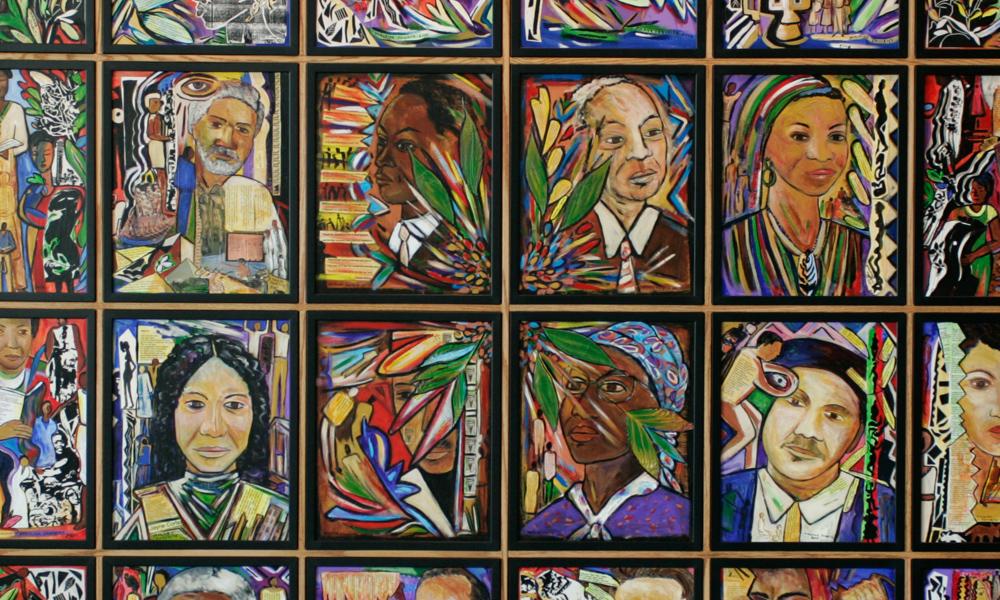
SUMMARY: Now in its third decade, the Furious Flower Poetry Center at JMU has been a driving force in showcasing, promoting and analyzing African American poetry, both nationally and internationally. The center, founded by Joanne Gabbin, is dedicated to poet Gwendolyn Brooks’ literary legacy and impact.
By Karen Risch Mott
Beginning with a modest idea to honor a woman unjustly dismissed, the 1994 Furious Flower Poetry Conference at JMU turned out to be a watershed moment in American literature.
Years before, English professor Joanne V. Gabbin had been shocked to learn that she occupied a faculty position for which Gwendolyn Brooks had been passed over. Notwithstanding Brooks’ 1950 Pulitzer Prize, and her status as the first black writer to be awarded such distinction, the college had deemed Brooks’ credentials insufficient. After this unwelcome discovery, Gabbin vowed that, wherever she might teach in the future, she would showcase Brooks in a poetry reading.
Gabbin made good on her word at the handful of institutions where she worked over the next 14 years. Soon after she was hired at JMU in 1985, she invited Brooks to read here, too, and the poet made her first trip to the Shenandoah Valley. Less than a decade later, Gabbin wanted to bring her back, this time to celebrate her friend’s body of work with a reading by Brooks’ peers and literary children. She started planning for a crowd of a little over 100, including the audience, conceiving a humble but meaningful tribute taking its name from a line in one of Brooks’ poems:
The time
cracks into furious flower. Lifts its face
all unashamed. And sways in wicked grace.
— Gwendolyn Brooks, The Second Sermon on the Warpland
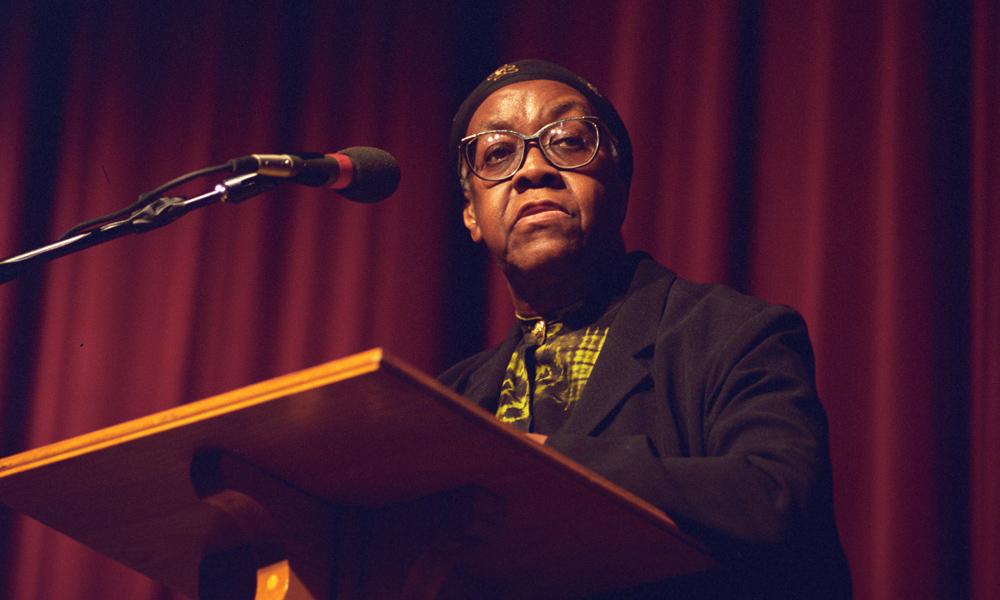
|
As word spread, however, that first Furious Flower Poetry Conference grew into a major scholarly event with more than 1,000 in attendance—likely the largest gathering of black poets, critics and other literary scholars in U.S. history.
“So many poets and scholars flocked to the first conference in 1994 because, I believe, they wanted to be in the midst of those who loved and valued what they did,” Gabbin said.
Although the Washington Post heralded the conference as historic, Gabbin is certain that “the most gratifying gaze was the interior one. Poets came to celebrate Brooks and left seeing how their work had more that united them in purpose than separated them.”
In 2005, following a second, equally successful conference, JMU became the nation’s first university to establish an academic center devoted to the promotion, study and preservation of black poetry: the Furious Flower Poetry Center, founded and directed by Gabbin. The center is dedicated to Brooks’ literary legacy and impact.
“I see Furious Flower’s singular contribution as providing a space where black poetry is valued, respected and celebrated without regard to the established literary arbiters who have sometimes ignored its significance,” Gabbin said.
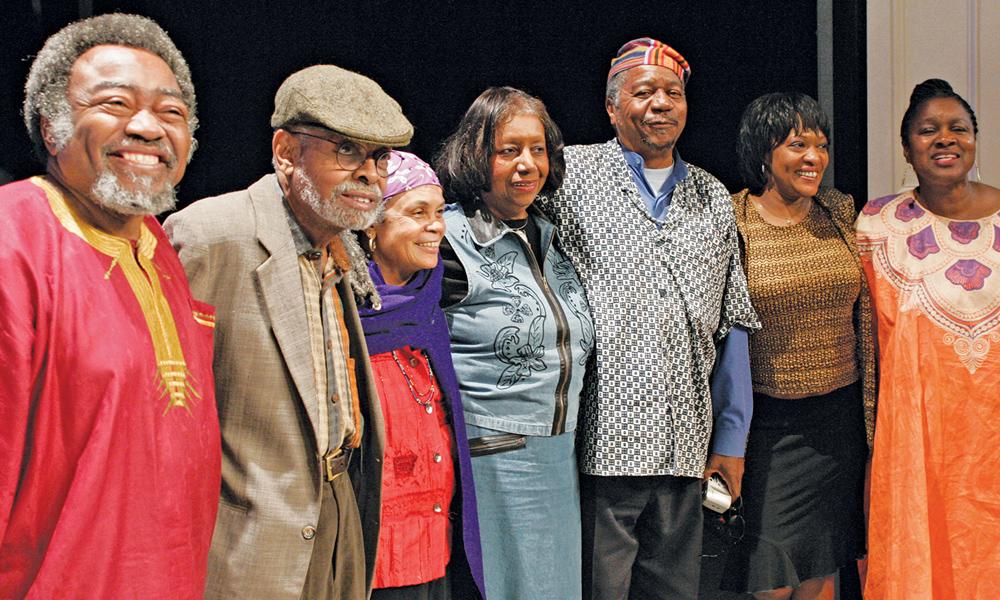
|
JMU Provost and Senior Vice President for Academic Affairs Heather Coltman believes the expansive impact of the center comes from its focus on connecting people and places through the spoken and written word. “Whether through outreach, education or pure performance … its reach is global, and it has served to make our world smaller through the beauty and mystery of poetry,” she said.
“I am excited to see how the center will expand its reach—with its mission to fearlessly embrace the deeply personal and moving stories captured in poetry—by being ever more visible and bold.”
Furious Flower at the Smithsonian
The 25th anniversary of the center presents an opportunity to both celebrate its accomplishments and to work toward securing its future.
Two high-profile events are planned in Washington, D.C., in September.
- Benefit Gala at the Grand Hyatt Washington — Sept. 27, 7 p.m.
Literary luminaries Elizabeth Alexander and Terrance Hayes will be joined by three U.S. poets laureate—Tracy K. Smith, Natasha Trethewey and Rita Dove—for a gala featuring dinner and poetry readings. The ticketed event will raise funds supporting the endowment of the Furious Flower Poetry Center, ensuring its ability to continue serving students, educators and poets everywhere. - 25th Anniversary Celebration at the National Museum of African American History and Culture — Sept. 28, all day
Reminiscent of the decade-defining conferences that have been Furious Flower’s hallmark, this free event will offer diverse and rich programming all day long at the museum. Attendees will enjoy poetry readings by 25 renowned poets, an afternoon panel in the museum’s Oprah Winfrey Theater and interactive workshops on the practice of writing poetry. The festivities will include remarks from Lonnie Bunch, the newly installed head of the Smithsonian Institution.
More information on both events is available at furiousflower25.com.
Furious Flower operates with a core staff of two full-time and two part-time employees and, like other academic centers at JMU, it relies heavily on gifts and grants to underwrite its ambitious projects. Last year, the center began an endowment campaign to help ensure its viability and longevity, particularly as the staff and the center’s Advisory Board prepare for Gabbin’s inevitable retirement.
Digital archive
Created and curated by students in the Spring 2019 JMU X-Labs course “Innovating the Archive,” this digital repository of previously inaccessible video, photography, poetry and commentary from the momentous 1994 Furious Flower Poetry Conference—augmented with new lesson plans—provides the general public its first look inside the valuable trove of materials now housed in Special Collections at JMU’s Carrier Library. The archive is also available on the center’s website, furiousflower.org.
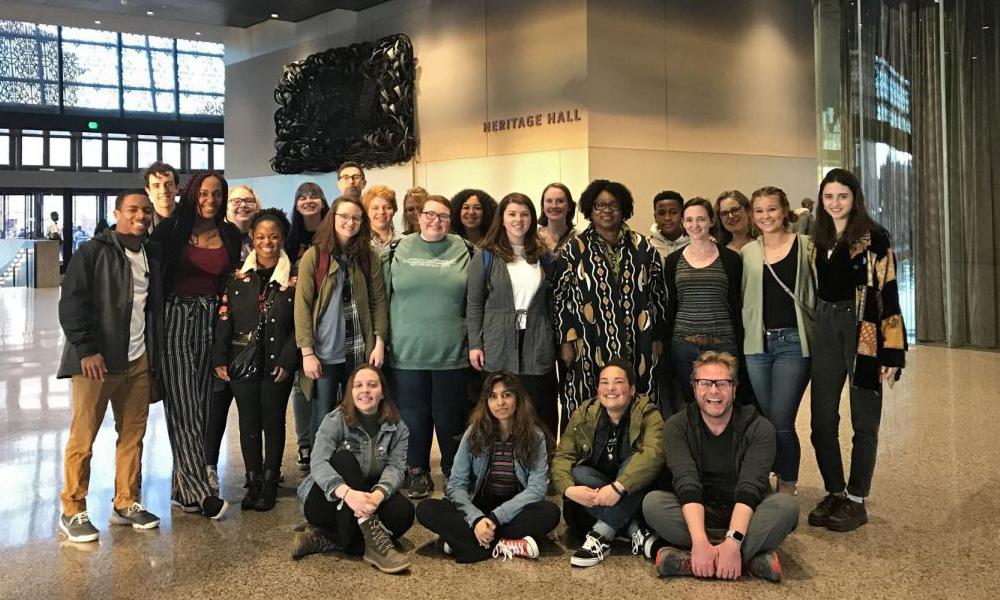 |
For English professor Mollie Godfrey, who has extensive training and experience in the recovery and preservation of black literary archives, the biggest takeaway from guiding students through the project is recognizing “the enormous, but almost entirely invisible, nature of archival labor. Most people don’t understand what it takes to preserve, organize, catalog and synthesize an archive, much less make it useable.”
She calculates that the students created 529 video clips and transcribed more than 54 hours of video; wrote 50 biographies; tracked down 66 poems for inclusion on the site and annotated 30 of them; created nine lesson plans; constructed 95 unique web pages; and designed three days’ worth of interactive conference programming. Their work was completed in a single semester, with 30 students and five faculty members assisted by colleagues and other experts.
Programs for grade school to graduate school and beyond
In the quarter-century since that first landmark event, Furious Flower has been committed to ensuring the visibility, inclusion and critical consideration of black poets in American letters, as well as in the whole range of educational curricula. The center’s programming seeks to cultivate an appreciation for poetry among students of all levels, from grade school to graduate school and beyond. It also seeks to support and promote poets at all stages of their careers and to preserve the history of black poets.
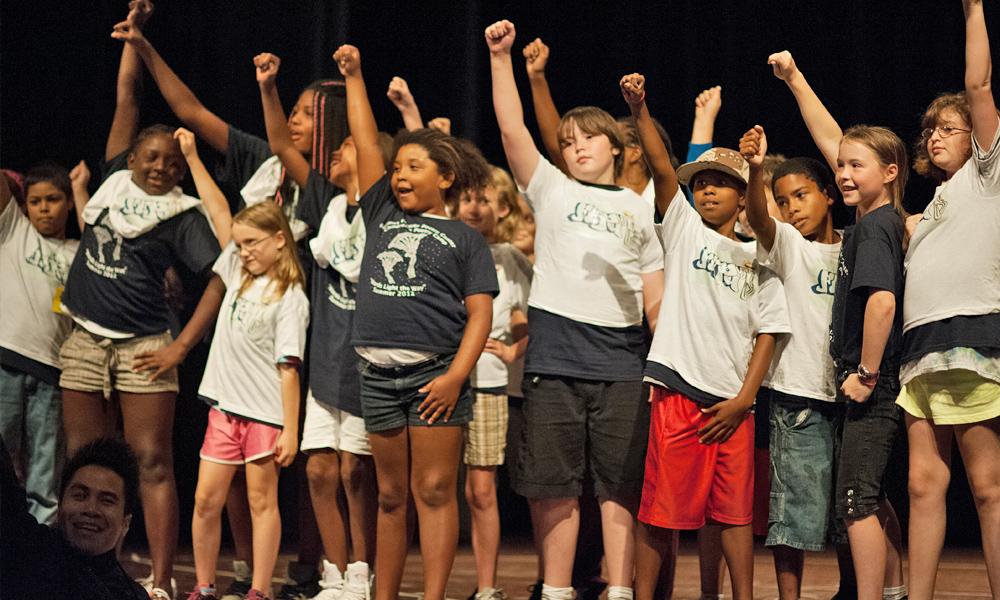 |
Over the years, Furious Flower has presented more than 200 poets reading their own work at JMU, many of them more than once, as well as:
- three major conferences (in 1994, 2004 and 2014), each with a subsequent book and video anthology to share the wealth with those who didn’t attend
- 15 weeklong summer creativity camps for students in Grades 3-8
- three biennial undergraduate seminars for creative writers
- three theatrical performances in tribute to Lucille Clifton (73 Poems for 73 Years in 2010), Toni Morrison (Sheer Good Fortune in 2012) and Maya Angelou (Throw Your Head Back and Sing in 2016)
- four biennial legacy seminars, giving educators an entire week not only to learn about—but to study with—legendary poets Clifton (2009), Sonia Sanchez (2012), Yusef Komunyakaa (2017) and, this past June, Nikki Giovanni (2019)
- 26 Lifetime Achievement Awards, given to those whose body of work has inspired and influenced younger poets
- An online literary journal, The Fight & The Fiddle
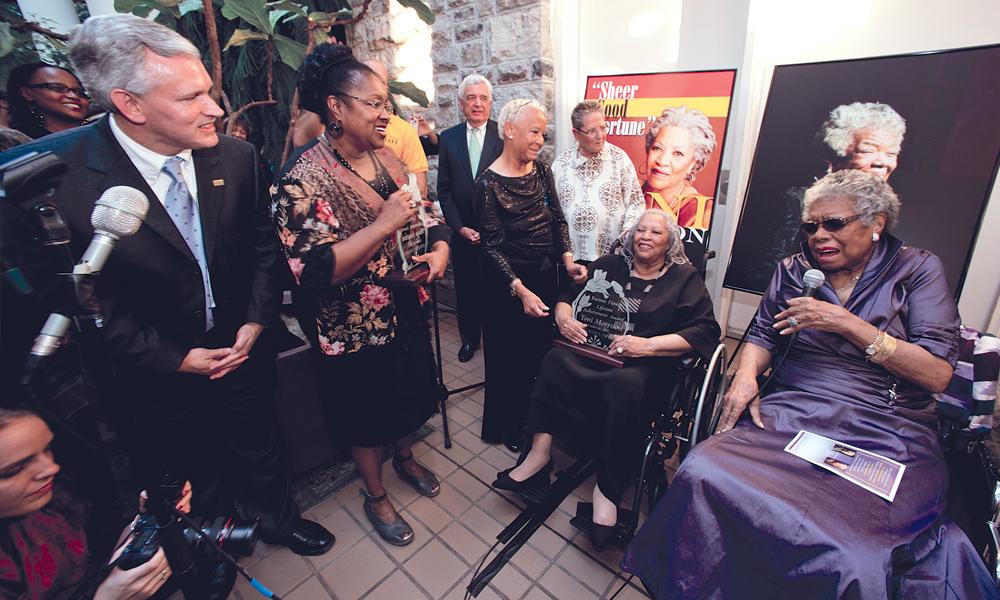
|
Several important projects and programs will be unveiled this fall.
New book out in December
Forthcoming from Northwestern University Press, Furious Flower: Seeding the Future of African American Poetry is both a poetry anthology and an essay collection. More than 100 recognized writers contributed their poems, and celebrated scholars considered the art and craft of this particular genre in essays that help frame the poetry. The first collection that features black poets describing their poetic processes, it was co-edited by Gabbin and Alleyne with a foreword by Rita Dove.
A scholar in residence
McKinley E. Melton is among 21 prestigious academics to be recognized with a $95,000 stipend and $7,500 research budget as part of his Frederick Burkhardt Residential Fellowship. A scholar of African American literature, he chose to establish his residency at the Furious Flower Poetry Center, where he will have an office for the 2019-20 academic year.
Melton will be working on a project titled Claiming All the World as Our Stage: Contemporary Black Poetry, Performance, and Resistance, which, according to Gettysburg College (where Melton is an English professor), “explores the cultural and political realities that link artists across boundaries, shaping a 21st-century poetics of resistance.” This fall at JMU, Melton will deliver a lecture from his work in progress, and he will assist in curating the center’s creative writing seminar for undergraduates in Spring 2020.
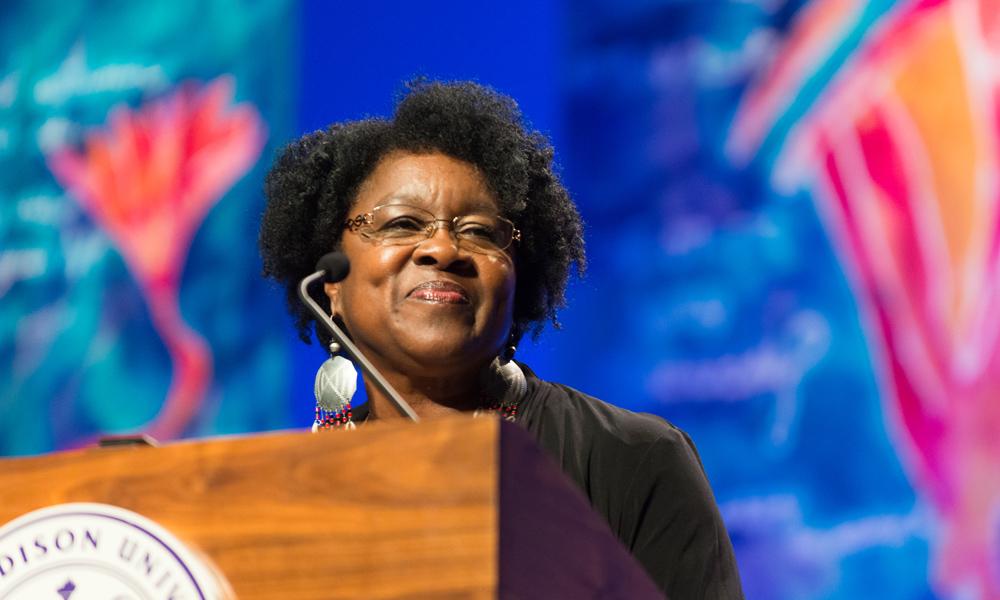 |
Fire power
The founder and executive director of the Furious Flower Poetry Center, Joanne V. Gabbin has been described as generous, genius, effusive, ebullient and a force to be reckoned with. “You don’t say no to Joanne,” people joke—and generally you don’t want to. Her vision and vivaciousness have powered hundreds of exciting endeavors both on and off the JMU campus.
In 2005, Gabbin founded the Furious Flower Poetry Center at the behest of former JMU President Linwood H. Rose.
|
"I see Furious Flower’s singular contribution as providing a space where black poetry is valued, respected and celebrated without regard to the established literary arbiters who have sometimes ignored its significance." — Joanne V. Gabbin, founder and executive director of the Furious Flower Poetry Center |
Furious Flower was a breakthrough, but it was hardly her first major academic achievement. A first-generation college graduate who went on to earn advanced degrees from the University of Chicago, Gabbin has been teaching African American literature classes to college students for almost 50 years. She has published extensively on the subject and won numerous awards for her teaching and scholarship, including national recognition as one of the nation’s top scholars of black poetry.
In addition, she served as the director of JMU’s Honors Program for nearly 20 years, from 1986 to 2005. In the summer of 2016, the program was designated an Honors College, something Gabbin had laid the groundwork for during her years as its director, and shortly thereafter, the new college was gifted its first named professorship—the Dr. Joanne Gabbin Professorship—which was endowed by one of Gabbin’s former students, Sean Tobin (’92), and his family.
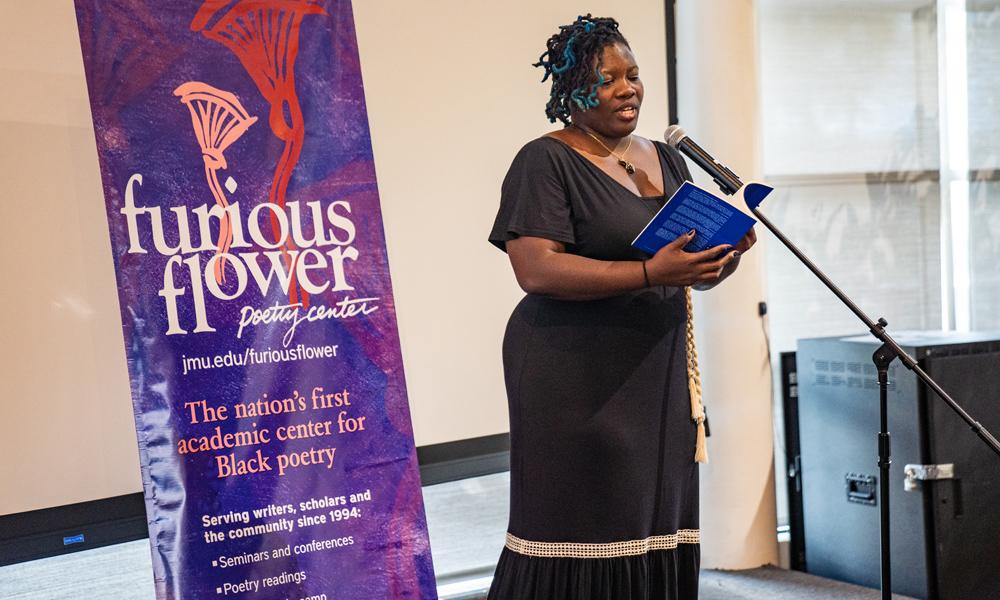 |
Star power
In the last year-and-a-half, Lauren K. Alleyne’s poetry has appeared in The Atlantic and The New York Times Magazine, as well as in Ms. magazine’s digital column, Ms. Muse. Also this year, she released her second award-winning collection of poetry, Honeyfish, both in the United States and the United Kingdom. She was featured in April on an NPR series for National Poetry Month.
Alleyne joined the English department faculty at JMU in 2016 and is the assistant director of the Furious Flower Poetry Center, where she is also editor of the center’s online literary journal, The Fight & The Fiddle.
|
"As long as our mission continues to be a quest to discover ‘What does black poetry, and what do black poets, most need in our time?’ … then that feeling of being seen and being heard, and being understood, and being known will continue." — Lauren K. Alleyne, assistant director |
Hailing from the twin island nation of Trinidad and Tobago, Alleyne earned her bachelor’s degree from St. Francis College, her Master of Arts from Iowa State University and her Master of Fine Arts from Cornell University. Now, she is working on her Ph.D. at the University of Virginia and looking forward to the challenges of keeping Furious Flower fresh and flourishing.
“As long as our mission continues to be a quest to discover ‘What does black poetry, and what do black poets, most need in our time?’—and we’re able to answer that question with whatever we create or celebrate—then that feeling of being seen and being heard, and being understood, and being known will continue. I hope we’re always able to provide that feeling for black poets and to provide that home for black poetry.”

